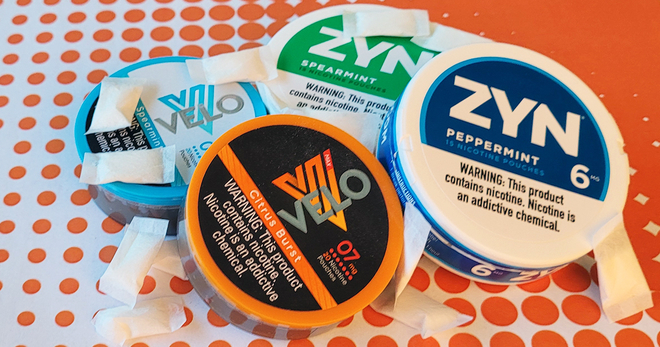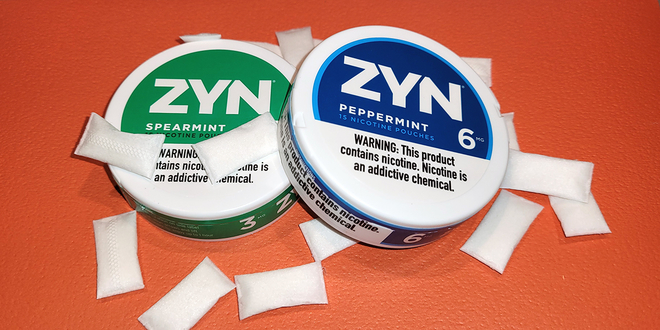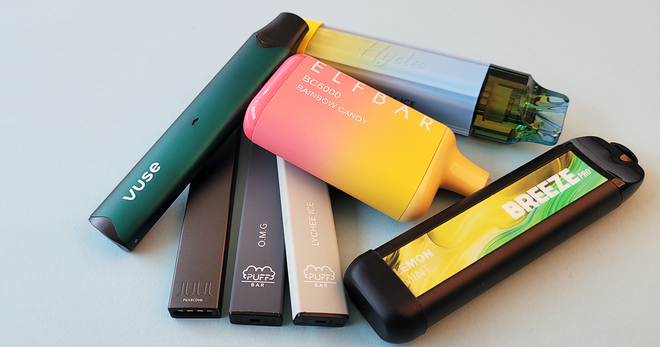Disposable e-cigarette’s vague new flavor names attempt to evade regulation
Makers of the popular disposable e-cigarette brand BIDI® Stick unveiled nearly a dozen new flavor names as direct translations from its previous flavors, a move researchers say appears designed to subvert future restriction on the sale of flavored disposable e-cigarettes. The new “concept” flavors – vague non-characterizing descriptions on packaging that do not expressly refer to flavors – include “Marigold” (formerly “Icy Mango”), “Arctic” (“Mint Freeze”), and “Solar” (“Berry Blast”), among others.
The use of concept flavors aligns with historic tactics of modifying product characteristics, labeling or packaging to maintain sales and subvert flavor restrictions designed to deter youth use, according to research published in Tobacco Control by Truth Initiative and the National Opinion Research Center that examines the move. Concept flavors pose a challenge for enforcement of flavored tobacco restrictions, as they can make it difficult for enforcement agencies to determine whether a tobacco product meets the legal definition of a flavored tobacco product.
Disposable e-cigarettes have skyrocketed in popularity following the product’s exemption from federal restrictions on flavored e-cigarettes, with use increasing about 1,000% (from 2.4% to 26.5%) among high school e-cigarette users and more than 400% (from 3% to 15.2%) among middle school e-cigarette users in 2020. Making up nearly a quarter of the disposable e-cigarette market in the U.S., BIDI sticks are the second highest-selling disposable e-cigarette, behind only Puff Bar.
New names, same flavors
What is a bidi stick
The move, which the company claims is to prevent youth use, rolled out on digital media platforms and prominently featured direct translations between previous and new flavor names. In August 2020, the Florida-based electronic cigarette company launched campaigns on Instagram, Facebook, and its official website to promote the new flavor “concepts.” Since the company’s founding in 2019, BIDI® Sticks have been sold in 11 flavors including Jungle Juice, Fruity Mango, Icy Mango, Dragon Venom, and Lush Ice.
Ads state that the new product names are part of the company’s “efforts to stand against underage selling of vape products” and “ensure that the products aren’t appealing to the youth,” according to the publication. Study authors question this motive: “Shifting to non-characterizing flavor names while retaining identical formulations is a literal interpretation of the regulation that flouts the spirit of its intended purpose – to restrict product designs (i.e., flavors) that appeal to youth and prevent initiation among youth.”
Evasive tactics extend to nicotine pouches
nicotine pouches
The company’s new flavor names aren’t restricted to e-cigarettes. BIDI® Vapor also launched non-tobacco-derived nicotine pouches in six non-characterizing flavors (arctic, haze, winter, solar, regal, summer). Like the strategy for their e-cigarette products, the flavor translations are provided on the company website and characterizing flavor names are currently included in smaller font on the product packaging.
Oral nicotine pouches are a new category of tobacco products that come in an array of youth-friendly flavors that are growing in popularity. Faced with flavor restrictions on pod-based e-cigarettes, young people are switching to products like oral nicotine pouches that still offer flavors and aren’t as tightly regulated as other tobacco products in the U.S.
Proposed flavor ban doesn’t extend to e-cigarettes
E-cigarette flavor ban
Although the FDA announced in April 2021 that it is working toward issuing proposed product standards within the next year to ban menthol as a characterizing flavor in cigarettes and ban all characterizing flavors (including menthol) in cigars, the standards don’t extend to e-cigarettes.
Truth Initiative has called on the FDA to eliminate all flavored tobacco products from the market and urged the agency to take non-characterizing flavors into account when restricting flavored products to prevent the tobacco industry from evading legislation designed to prevent youth use.




